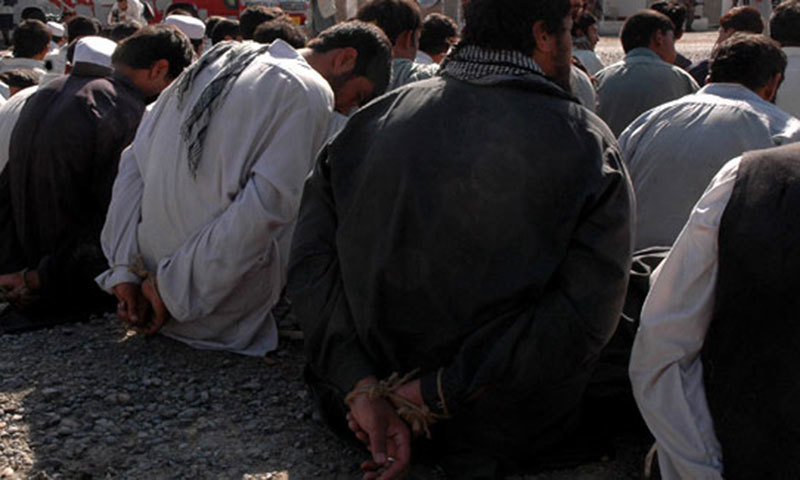ISLAMABAD: The government has decided to upgrade a group of proscribed organisations to ‘high risk’ and start monitoring and re-examining their activities and profiles under heightened security checks at all layers of legal, administrative, investigative and financial regimes to comply with the requirement of the Financial Action Task Force (FATF).
The Paris-based global watchdog against financial crimes had expressed dissatisfaction over considering these entities as low to medium risk and said Pakistan did “not demonstrate a proper understanding of the terror financing risks posed by Daesh, AQ (Al Qaeda), Jud (Jamaatud Dawa), FIF (Falah-i-Insaniat Foundation), LeT (Lashkar-e-Taiba), JeM (Jaish-e-Mohammad), HQN (Haqqani network), and persons affiliated with the Taliban”.
Pakistan on FATF’s grey list: what, why, and why now?
All these entities have now been described as high-risk entities and would be subject to greater scrutiny by all agencies and institutions of the state, starting from their registration to operations and from their fund collection to bank accounts and issuance of suspicious transactions, information sharing and so on, explained an official. He said these decisions were taken at a meeting of the general council on FATF led by Finance Secretary Arif Ahmed Khan as part of a series of meetings to comply with the FATF obligations.
Proscribed organisations will be subject to greater scrutiny by state agencies and institutions
Mr Khan had led the Pakistani delegation to Paris during the Feb 18-22 meetings of the FATF plenary and its group reviews. During the course of these meetings, Pakistan had banned the FIF and JuD on Feb 21.
The official said that based on revised risk profile to high from medium, all the institutions, including the Federal Investigation Agency, Securities and Exchange Commission of Pakistan, State Bank of Pakistan, National Counter-Terrorism Authority, Financial Monitoring Unit and relevant intelligence agencies, would separately review records, databanks and procedures and methodologies regarding the proscribed entities and their representatives.
Based on this review exercise and re-evaluation of risk indicators, fresh suspected transaction reports would originate and run through the banking sector, while law enforcement agencies would continue their ongoing tough actions against the banned entities, including confiscation of their assets and accounts.
All these institutions would complete this exercise within two weeks so as to present a compliance report to a delegation of the Asia-Pacific Joint Group — a regional associate of the FATF — due to visit Islamabad on March 24. The delegation would review Pakistan’s performance on the basis of Islamabad’s fresh exercise over the next two days (March 25-26) and submit its assessment report to the FATF headquarters.
The FATF would make a fresh review of Pakistan’s current progress and compliance with the remaining targets by May and conclude in its June review meetings whether the country should be moved out of the ‘grey list’ or kept in this list in case of minor shortcomings or be downgraded to the ‘black list’ having serious financial and economic repercussions in case of serious shortcomings.
Officials said that defining these banned entities as high-risk meant the investigation agencies, supervisory and regulatory organisations and related institutions would be more alert and proactive to assessments of risk indicators, red flags, guidance and advisories and would be required to the heightened level of inter-agency coordination for information sharing and actions to combat terror financing and money laundering, considered risk to global economy.
During the Feb 18-22 plenary and review meetings, the FATF had noted “limited progress” by Pakistan on targets set for January 2019, and urged the country “to swiftly complete its action plan, particularly those with timelines of May 2019.”
The FATF had noted that Pakistan had “taken steps towards improving its AML/CFT [anti-money laundering/combating financing of terrorism] regime, including by operationalising the integrated database for its currency declaration regime” after its June 2018 high-level political commitment to work with the FATF and APG to strengthen its AML/CFT regime and to address its strategic counterterrorist financing-related deficiencies.
Pakistan was asked to comply with a 10-point action plan. For this, the country will be required to adequately demonstrate its proper understanding of the terror financing risks posed by the terrorist groups listed above, and conducting supervision on a risk-sensitive basis and prove that remedial actions and sanctions are applied in cases of AML/CFT violations, and that these actions have an effect on AML/CFT compliance by financial institutions.
Pakistan will also have to demonstrate that competent authorities are cooperating and taking action to identify and take enforcement action against illegal money or value transfer services and demonstrating that authorities are identifying cash couriers and enforcing controls on illicit movement of currency and understanding the risk of cash couriers being used for terror financing.
The country will also have to improve inter-agency coordination, including between provincial and federal authorities on combating terror financing risks and demonstrate that law enforcement agencies are identifying and investigating the widest range of terror financing activity and that such investigations and prosecutions target designated persons and entities, and persons and entities acting on behalf or at the directive of the designated persons or entities.
Moreover, the country will have to demonstrate that terror financing prosecutions result in effective, proportionate and dissuasive sanctions and enhancing the capacity and support for prosecutors and the judiciary and to show effective implementation of targeted financial sanctions (supported by a comprehensive legal obligation) against all 1267 and 1373 (UN resolutions) designated terrorists and those acting for or on their behalf, including preventing the raising and moving of funds, identifying and freezing assets (movable and immovable), and prohibiting access to funds and financial services.
On top of that, Pakistan will have to demonstrate enforcement against terror financing sanctions violations, including administrative and criminal penalties, and provincial and federal authorities cooperating on enforcement cases and prove beyond doubt that facilities and services owned or controlled by designated persons were deprived of their resources and usage of the resources.
Published in Dawn, March 9th, 2019














































